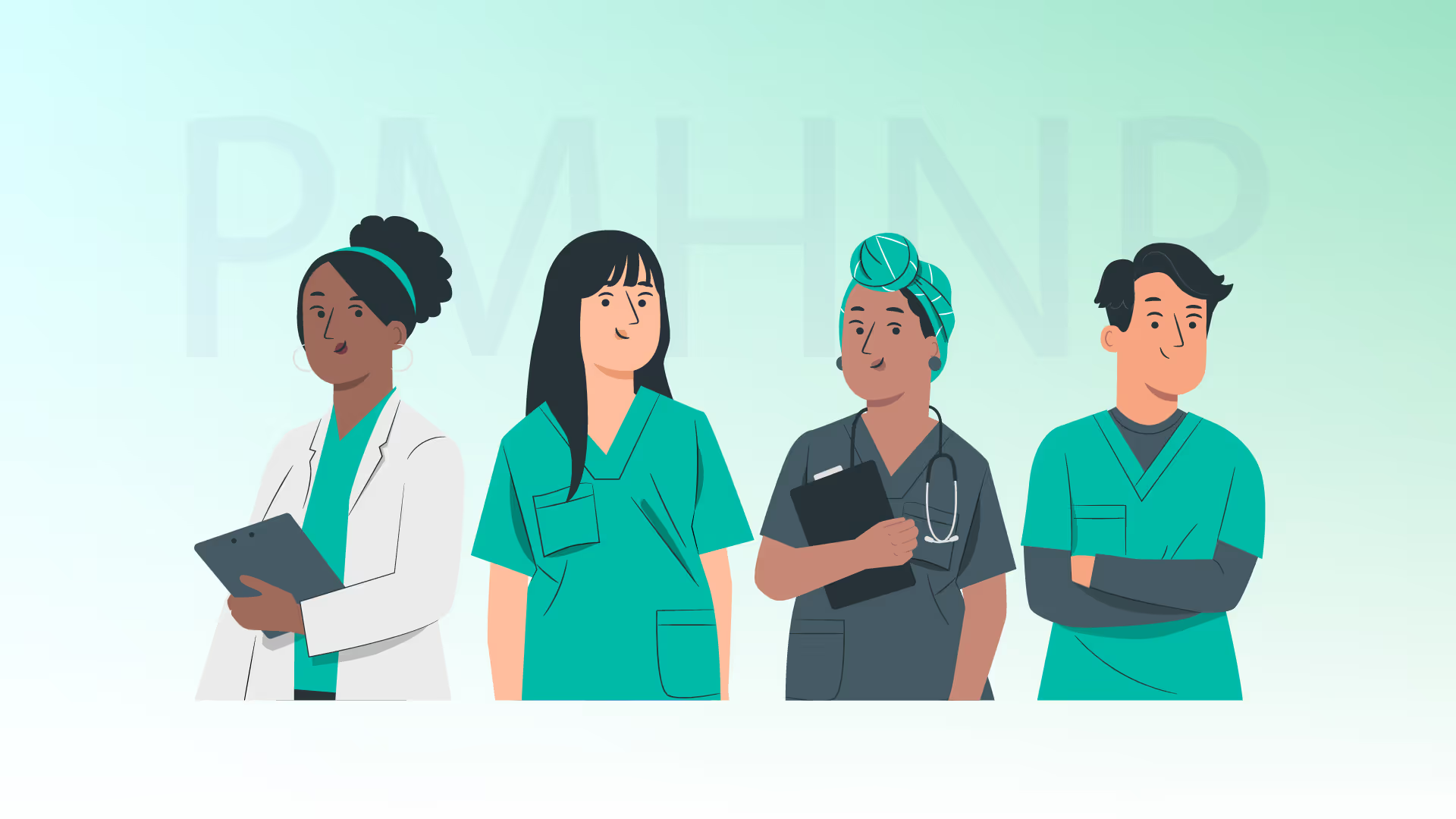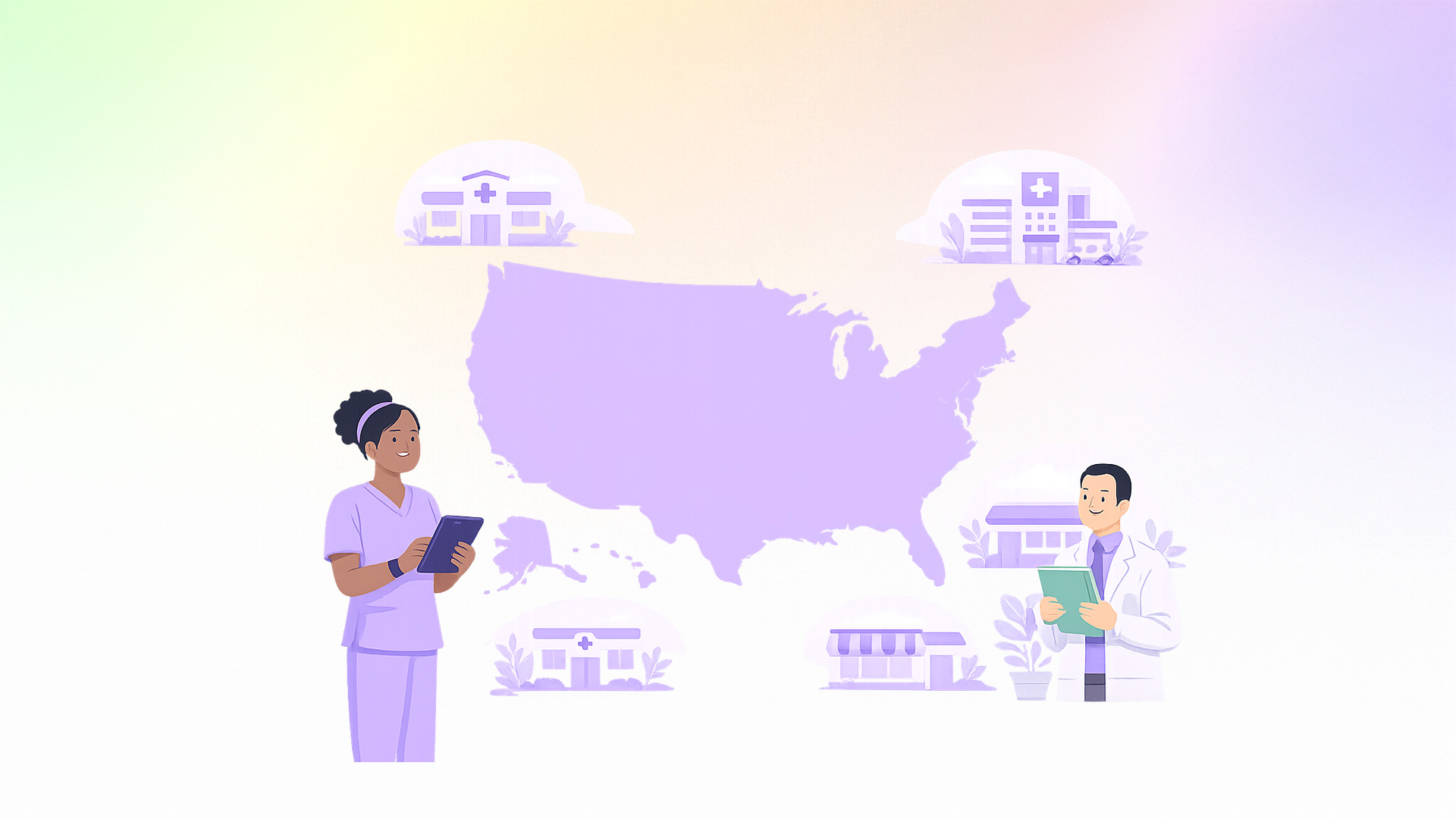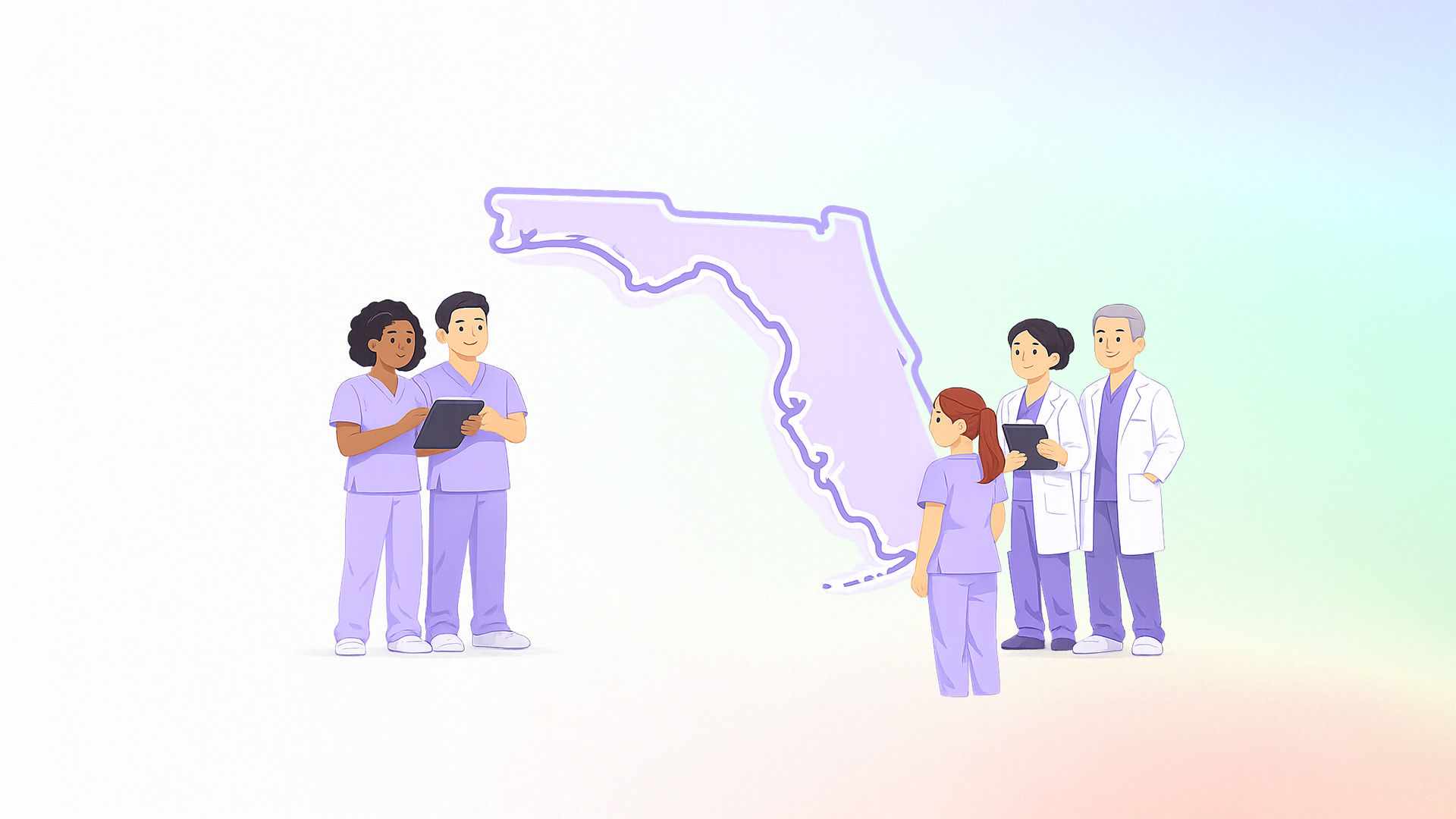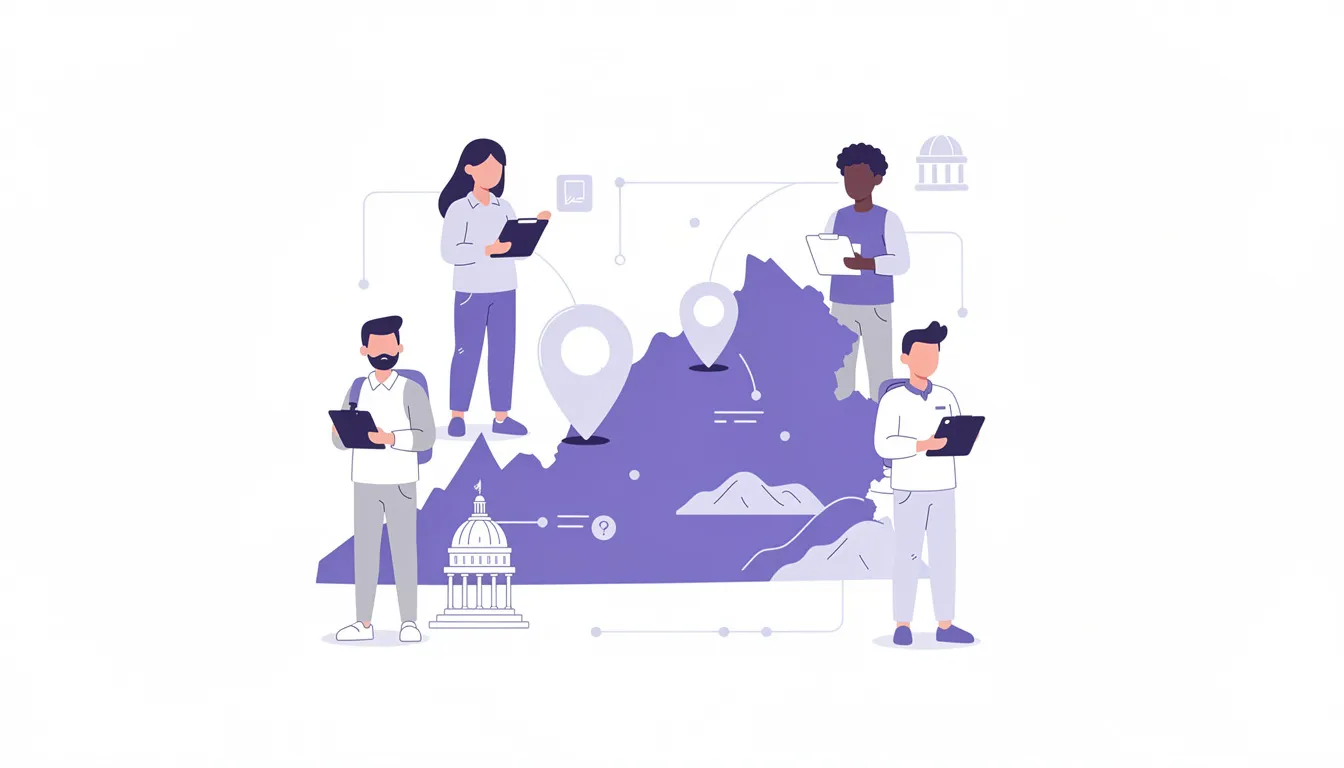Finding a Psychiatric-Mental Health Nurse Practitioner (PMHNP) preceptor is essential for completing your clinical hours, gaining real-world experience, and graduating on time. These preceptors supervise your hands-on training in mental health settings and help you apply your classroom knowledge to diagnose, treat, and support patients across the lifespan.
If you're already feeling the pressure of securing a placement and want to skip the months-long search, NPHub connects nurse practitioner students with qualified PMHNP preceptors who are ready to mentor you. Explore vetted psych preceptors in your area or keep reading to learn how to navigate the search on your own.
TL;DR – Finding Psychiatric-Mental Health Nurse Practitioner (PMHNP) preceptors and clinical rotations
- PMHNP preceptors are essential for completing your clinical hours and gaining hands-on psychiatric training required for graduation and licensure.
- Finding a preceptor can be tough due to provider shortages, burnout, and increased competition from growing NP programs.
- Sub-specialties like child/adolescent, geriatric, and addiction psych require targeted clinical experience to build real-world skills.
- Telepsychiatry and paid matching services like NPHub offer flexible, reliable options to secure placements faster and reduce stress.
- PMHNPs are in massive demand nationwide—with 62% projected job growth and salaries averaging $118K+—making this effort well worth it.

Finding a PMHNP Preceptor Shouldn't Break You
Can't find PMHNP preceptors and starting to spiral? Deep breaths, you're not alone.
Tracking down clinical rotations as a psychiatric mental health nurse practitioner student can feel like a full-time job (on top of, you know… your actual full-time job, coursework, and trying to stay caffeinated). The reality is that gaining hands-on experience in clinical practice is crucial for:
- Applying theoretical knowledge to real patient care situations
- Developing essential skills needed to serve patients effectively
- Meeting your program's requirements for graduation and licensure
- Building confidence in medication management and therapy techniques
We get it—it's frustrating, exhausting, and sometimes downright discouraging. The process of finding potential preceptors while juggling nursing practice responsibilities and education requirements can leave even the most committed students feeling overwhelmed.
But don't worry. In this guide, we're breaking down:
- Why PMHNP preceptors are so essential for your professional development
- How to actually find the perfect preceptor without selling your soul
- Real-world tips to help you push through the struggle of clinical placement hunting
- Whether you're looking for in person training or exploring telepsychiatry options
We'll help you navigate this crucial step in achieving your career goals.
But if you need it faster or simply want to stop wasting months on dead-end preceptor searches. NPHub connects you with vetted PMHNP preceptors in days, not months—so you can graduate on time without the stress. Create your free account today and join 8,000+ students who chose the smarter path.
What is a Psychiatric-Mental Health Nurse Practitioner (PMHNP)?
A Psychiatric-Mental Health Nurse Practitioner (PMHNP) is a highly trained, advanced practice registered nurse who specializes in mental health care. Think of them as a vital bridge between psychiatry and nursing, someone who can diagnose, treat, prescribe, and counsel, all while bringing a holistic, patient-centered approach to care.
PMHNPs work with individuals across the lifespan—from children to older adults—and in a variety of settings, including hospitals, private practices, community clinics, schools, correctional facilities, and telehealth platforms.
The role of a PMHNP is broad and impactful. Responsibilities often include:
- Assessing and diagnosing mental health and psychiatric conditions
- Prescribing and managing medications for conditions such as anxiety, depression, bipolar disorder, schizophrenia, PTSD, ADHD, and more
- Providing therapy, including individual, group, and family counseling
- Supporting patients with dual diagnoses, such as co-occurring substance use disorders
- Educating patients and families about mental health conditions and treatment options
- Developing care plans that promote recovery, improve coping strategies, and support long-term wellness
- Collaborating with other healthcare providers to ensure comprehensive, coordinated care
They don't just hand out meds or read charts. PMHNPs are deeply involved in helping patients reclaim their lives, manage symptoms, and develop long-term strategies for wellness and recovery.
If you're already panicking about finding a psych preceptor, take a breath. You're not behind, and you don't have to scramble alone. Start your search with NPHub and we'll help you match with a vetted PMHNP preceptor who fits your location, specialty, and timeline. Less chasing, more peace of mind.
Different types of PMHNP sub-specialties
Psychiatric-Mental Health Nurse Practitioners (PMHNPs) don't just have one lane, they've got an entire highway of sub-specialties to choose from.
Whether you're drawn to working with kids, older adults, or those battling addiction, there's a path that aligns with your passion and purpose. Diverse clinical settings are crucial in training PMHNPs for these various sub-specialties, providing hands-on experiences that are essential for developing the necessary skills.
Here's a breakdown of some key PMHNP sub-specialties:
Child and adolescent psychiatric-mental health
Working with younger populations isn't just about “phases” and “growing pains”—it requires specialized training and a lot of heart.
PMHNPs in this sub-specialty are trained to assess and treat:
- ADHD and autism spectrum disorders
- Mood and anxiety disorders
- Eating disorders such as anorexia and bulimia
- Behavioral and developmental challenges unique to children and teens
These NPs often collaborate with families, schools, and pediatricians to create support systems that address emotional, behavioral, and developmental needs early on—before they evolve into lifelong struggles.
Geriatric psychiatric-mental health
Mental health challenges don't disappear with age. In fact, they often become more complex. Geriatric PMHNPs focus on the unique psychiatric needs of older adults, a population that is rapidly growing—and underserved.
Common areas of focus include:
- Alzheimer's disease and other forms of dementia
- Depression and anxiety related to aging
- Coping with isolation, grief, and end-of-life concerns
These providers not only manage psychiatric symptoms but also support cognitive function, emotional wellness, and quality of life for seniors navigating a vulnerable life stage.
Addiction and substance use Disorders
Addiction isn't one-size-fits-all, and neither is recovery. PMHNPs who specialize in addiction treatment work with individuals experiencing substance abuse, behavioral addictions, or dual diagnoses involving co-occurring mental health conditions.
Common areas of treatment:
- Alcohol and drug dependency
- Behavioral addictions like gambling, sex, or food
- Co-occurring psychiatric conditions such as PTSD or depression
PMHNPs in this specialty may work in detox centers, outpatient clinics, inpatient recovery programs, halfway houses, or community-based rehab settings. They play a critical role in guiding patients through withdrawal, stabilization, and long-term recovery.
Explore More PMHNP Clinical Topics
- Telehealth PMHNP Preceptors
- Child & Adolescent Psychiatry NP Preceptors
- Geriatric Psychiatry - PMHNP
- Addiction Psychiatry NP Preceptors
- PMHNP Rotations in Correctional Facilities
- Inpatient Psychiatry - PMHNP
- Best Cities for PMHNP Students
- From Student to Provider: How Clinical Rotations Shape Your PMHNP Career Path
- Why It’s So Hard to Find PMHNP Preceptors
- Future of Psychiatric Nursing Education
Why PMHNPs matter more than ever
With the ongoing mental health crisis and shortage of psychiatric providers, PMHNPs are stepping up in a big way. They increase access to mental health services, especially in underserved areas, and bring a unique combination of clinical expertise and compassionate care. Nurse practitioner programs are essential in preparing PMHNPs to meet the increasing demand for mental health services.
As licensed and credentialed providers, PMHNPs are equipped to:
- Offer continuity of care across settings and stages of recovery
- Deliver culturally competent, trauma-informed care
- Reduce stigma by normalizing mental health support in everyday healthcare
- Promote mental health education and prevention in their communities
Bottom line: PMHNPs are not just “nice to have”—they are absolutely essential to the future of accessible, high-quality mental healthcare.
Statistics in the US
The U.S. is facing a growing mental health crisis, but there simply aren't enough qualified professionals to meet the demand.
According to the American Psychiatric Association, the number of adult psychiatrists is expected to drop by 20% by 2030, even as the demand for mental health care rises by 3%. That's a projected shortage of over 12,000 psychiatrists nationwide.
And the rural situation? Even more sobering. Roughly 75% of rural counties in the U.S. either have zero mental health providers or fewer than 50 per 100,000 residents. These are communities where PMHNPs can—and already do—make a life-changing impact.
The mental health fallout from the COVID-19 pandemic has only intensified the pressure:
- Rising rates of anxiety and depression
- Increases in substance abuse and addiction
- Alarming spikes in suicides and overdose deaths
People are struggling, and the gap between need and access is widening. PMHNPs are uniquely positioned to help close that gap—providing psychiatric assessments, prescribing medication, and offering therapy across the lifespan.
The silver lining? If you're a current or future PMHNP, the demand for your skills is off the charts—and that's not changing anytime soon.
- 46% growth in NP employment overall between 2021 and 2031 (9x the national average)
- 62% projected growth in PMHNP employment by 2030 (U.S. Health Resources & Services Administration)
In short: mental health providers are in high demand, and PMHNPs are leading the charge.
The average salary for PMHNPs is $118,000, according to 2023 data from Payscale. But don't stop there—your earning potential can climb even higher based on:
- Location: Urban areas or regions with higher living costs tend to offer higher salaries.
- Certifications & Experience: Advanced training or subspecialty credentials (like child/adolescent or addiction) can command a premium.
- Education: PMHNPs with a Doctor of Nursing Practice (DNP) or other advanced degrees often see greater earning power.
PMHNPs aren't just filling gaps they're transforming lives. Whether you're driven by passion, purpose, or both, this career offers a rare blend of professional fulfillment and long-term stability. The path forward is clear and the mental health field needs you more than ever.
Where does a PMHNP work?
One of the biggest perks of becoming a Psychiatric-Mental Health Nurse Practitioner (PMHNP)? You're not locked into just one setting or population. PMHNPs are incredibly versatile providers who can work in a wide range of environments, each offering unique opportunities to make an impact. Diverse mental health settings provide comprehensive training and work opportunities, enriching the experience and competency of future practitioners.
- Hospitals and Inpatient facilities
From general psychiatric units to specialized areas like addiction recovery and geriatric psychiatry, hospitals rely on PMHNPs for comprehensive psychiatric assessments, medication management, and therapy. Inpatient psychiatric facilities also depend on PMHNPs to manage acute psychiatric crises and support patient stabilization.
- Community-Based settings
Community mental health centers, public health departments, and nonprofit agencies serve some of the most underserved populations. PMHNPs in these settings often act as the frontline mental health providers, delivering therapy and medication management to individuals who might otherwise go without care.
- Correctional and Forensic environments
Incarcerated populations have some of the highest rates of untreated mental illness. PMHNPs working in jails, prisons, and juvenile detention centers provide critical psychiatric support, helping individuals manage serious mental health conditions in highly structured environments.
- Colleges, Universities, and Schools
Academic institutions increasingly recognize the mental health needs of students. PMHNPs can work in college counseling centers or K–12 schools, offering therapy, crisis intervention, and mental health education to students navigating high-stress environments.
- Private practice and independent clinics
In states where PMHNPs have full practice authority, they can run their own clinics. Whether working independently or as part of a group practice, this path allows PMHNPs to serve specific populations, offer therapy, prescribe medication, and build long-term provider-patient relationships.
- Telepsychiatry and remote care
The rise of telehealth has opened up even more doors for PMHNPs. Virtual mental health care allows providers to reach patients in rural or underserved regions—offering flexibility for both the provider and the patient.
- Specialized facilities and alternative settings
PMHNPs can also be found in:
- Residential substance abuse treatment centers
- Domestic violence shelters
- Disaster response organizations
- Nursing homes and assisted living facilities
- Government agencies and veterans' health systems
- Doctors' offices, collaborating with psychiatrists or PCPs
Whether you're drawn to working with youth, veterans, older adults, or underserved communities, there's a setting that matches your interests and goals.
Overcoming challenges in securing PMHNP Preceptors
Let's not sugarcoat it: finding a PMHNP preceptor can feel like trying to land Beyoncé tickets with dial-up internet. It's one of the biggest hurdles in the PMHNP journey, and you're definitely not imagining the struggle.
The preceptor shortage? It's real. And while it's been an issue for years, the COVID-19 pandemic made it even worse. Many preceptors are overworked, burned out, or simply don't have the bandwidth to take on students. That means fewer clinical slots, longer search times, and a lot of NPs-in-training refreshing their inbox like it's a full-time job.
By this point in the process, most students are exhausted, emails go unanswered, phone calls get ignored, and the clock keeps ticking, so before you burn out, read how other NP students turned things around with NPHub's support. Their stories might hit a little too close to home—in the best possible way and show you it's not too late to secure your rotation and stay on track.
Why is it so hard to find a preceptor?
Here's the deal:
- Precepting is extra work. Mentoring students takes time, energy, and responsibility—on top of an already packed patient load.
- Clinical sites are limited. Especially in rural or underserved areas where providers are stretched thin.
- Schools are competing for spots. As more NP programs pop up, everyone's fishing in the same preceptor pool.
But even with the obstacles, there are ways to make it happen, and some silver linings too.
Solutions That Actually Work
- Telehealth to the rescue
One of the few pandemic perks? Telepsychiatry has exploded. Many PMHNP students are gaining meaningful experience through virtual platforms—conducting assessments, managing medication, and building rapport with patients remotely. It's legit training for a future where digital care is here to stay. - Interdisciplinary collaboration
Mental health care doesn't live in a bubble. Students can benefit from working alongside therapists, social workers, primary care NPs, and even case managers. This cross-training approach offers a broader view of patient care and builds collaboration skills you'll need in real-world practice. - Cultural humility + flexibility = clinical gold
Here's the truth: being a great student isn't just about what you know—it's about how you show up. Demonstrating cultural humility, adaptability, and a willingness to learn goes a long way in building trust with potential preceptors. Remember, you're not just asking for a spot—you're offering to bring value.
What are the paid services to find preceptors?
For PMHNP students struggling to secure clinical placements, paid preceptor-matching services have become a reliable solution that addresses the growing gap between students and available clinical sites.
These platforms connect nurse practitioner students with vetted preceptors across specialties—ensuring students complete their required clinical hours and meet program's requirements for graduation.
Why paid matching services work better:
- Streamlined process: Large networks of experienced healthcare professionals who are carefully screened, offering peace of mind and high-quality hands-on experience.
- Time savings: Focus on education and professional development instead of months cold-calling clinics.
- Better outcomes: Find the right preceptor who provides essential guidance in learning to assess, treat, and manage mental health conditions.
Offering compensation incentivizes preceptors to accept students, especially when many providers are hesitant due to burnout. The result is a more reliable partnership between student and mentor.
How NPHub goes beyond basic matching:
- Personalized placement: We match you with the perfect preceptor based on your career goals, location, and specialty focus.
- Full-service support: Our team handles paperwork, coordination, and guidance throughout your clinical rotation.
- Rigorous vetting: Only qualified healthcare professionals passionate about mentoring the next generation.
We understand juggling coursework, nursing practice responsibilities, and personal life while searching for potential preceptors is overwhelming. Whether you need in-person training or telepsychiatry experience, we ensure you're learning from providers dedicated to your success.
Ready to stop the preceptor hunt? Thousands of NP students have secured ideal placements through NPHub's proven system. Create your free account and get matched with vetted PMHNP preceptors who are excited to mentor you.
Your PMHNP journey is tough, but so are you
The path to becoming a Psychiatric-Mental Health Nurse Practitioner isn't easy.
From navigating clinicals and fighting for preceptor placements to choosing your specialty and finding your first job, every step demands grit, heart, and hustle. But here's the good news: the demand for PMHNPs has never been higher, and the work you're doing is deeply needed.
Whether you're just starting out or knee-deep in the chaos of clinical placements, know this, you're not alone, and you're not doing it for nothing.
You're building a career that changes lives, strengthens communities, and helps close the mental health gap across the U.S.
You've made it this far, and you shouldn't have to delay graduation or lose sleep over clinicals. Let us help you match with a vetted PMHNP preceptor, handle the paperwork, and secure your spot fast, so you can stay on schedule, reduce stress, and become the provider you've worked so hard to be.
You've got the heart. We'll help with the logistics. You're closer than you think.
Frequently Asked Questions: Finding PMHNP Preceptors and Clinical Rotations
1. What is a PMHNP preceptor and why do I need one?
A PMHNP preceptor is a licensed psychiatric provider (usually an NP, MD, or DO) who supervises your clinical rotations and mentors you through real-world psychiatric care. They’re essential for completing your required hours, graduating, and becoming board eligible.
2. How many clinical hours do PMHNP students typically need to complete?
Most PMHNP programs require 500–700 clinical hours, though exact numbers vary by school and state. These hours are usually spread across several rotations in diverse mental health settings.
3. How can NPHub help me find a PMHNP preceptor?
NPHub connects NP students with pre-vetted, qualified psychiatric preceptors who match their specialty, location, and scheduling needs. Our team handles outreach, coordination, and paperwork—so you can focus on learning, not cold-calling.
4. What’s the difference between finding a preceptor on your own vs. using a paid service?
one on your own often involves cold-calling and long wait times. Paid services like NPHub offer pre-vetted preceptors, faster matches, and full support with paperwork and coordination.
5. Is NPHub only for PMHNP students?
Nope! While we work with tons of PMHNP students, NPHub also helps students in FNP, AGNP, PNP, and other NP tracks. We match based on your specific needs and program requirements.
6. Can I choose where I do my clinical rotation with NPHub?
Absolutely. NPHub lets you search and filter by location, setting, and specialty. You can prioritize telehealth, outpatient clinics, or focus areas like substance use or geriatric psych.
7. Can I complete my PMHNP clinicals through telehealth or remote placements?
Yes! Many programs now allow telepsychiatry rotations, especially since COVID-19. It’s a legitimate and effective way to gain clinical experience in today’s healthcare landscape.
8. When should I start looking for a PMHNP preceptor?
Start at least 4–6 months before your rotation begins. Some schools require practicum site approvals up to a semester in advance, so early prep is key.
9. What happens if I can’t secure a preceptor in time?
You may need to delay your clinical course or graduation date. That’s why services like NPHub can be critical for staying on track.
10. Can a PMHNP student do rotations under a psychiatrist or another mental health provider?
Yes, many programs allow PMHNP students to be precepted by psychiatrists, psychiatric NPs, or other qualified mental health providers, depending on board and school rules.
Key Terms & Definitions
- PMHNP (Psychiatric-Mental Health Nurse Practitioner)
An advanced practice registered nurse (APRN) who specializes in mental health care, including diagnosis, therapy, and medication management for psychiatric conditions across the lifespan. - Preceptor
A licensed provider (typically a PMHNP, psychiatrist, or other mental health professional) who supervises and mentors NP students during their clinical rotations. - Clinical Rotation
A hands-on training experience in a healthcare setting where NP students apply classroom knowledge under the supervision of a qualified preceptor. - Telepsychiatry
The delivery of psychiatric care via telehealth platforms, allowing PMHNP students to conduct remote assessments, manage medications, and provide therapy during clinical rotations. - NPHub
A preceptor-matching service that connects NP students with vetted clinical preceptors, providing full support throughout the placement process, including coordination and paperwork. - Sub-specialty (PMHNP Track)
A focused area of PMHNP practice such as child/adolescent psychiatry, geriatric mental health, or addiction treatment, often requiring tailored clinical training. - Clinical Hours
The required number of supervised hours NP students must complete in clinical settings to graduate and qualify for certification—typically 500–700 for PMHNPs.
About the author
- NPHub Staff
At NPHub, we live and breathe clinical placements. Our team is made up of nurse practitioners, clinical coordinators, placement advisors, and former students who’ve been through the process themselves. We work directly with NP students across the country to help them secure high-quality preceptorships and graduate on time with confidence. - Last updated
November 13, 2025 - Fact-checked by
NPHub Clinical Placement Experts & Student Support Team - Sources and references
- https://my.clevelandclinic.org/health/articles/psychiatric-nurse-practitioner-pmhnp
- https://www.nursepractitionerlicense.com/aprn-guide/psychiatric-mental-health-nurse-practitioner-specialization/
- https://onlinenursing.baylor.edu/news/what-does-psychiatric-nurse-practitioner-do
- https://nursing.jnj.com/specialty/psychiatric-nurse-practitioner
- https://www.nphub.com
- https://www.nphub.com/testimonials
Find a preceptor who cares with NPHub
Book a rotation.webp)








.webp)


.webp)



%20(3)%20(2).svg)
.webp)